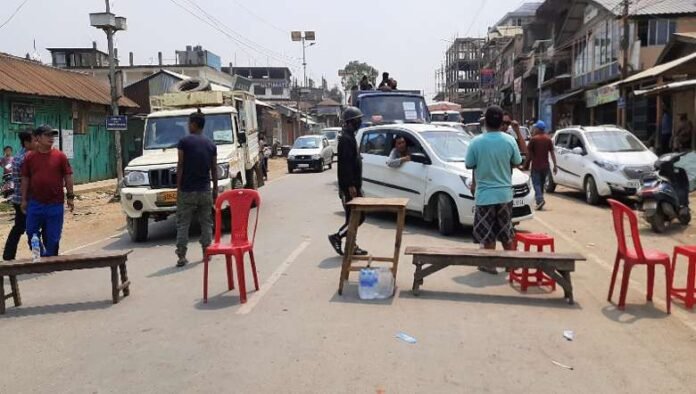The state of Manipur, already grappling with persistent ethnic strife, faced another wave of unrest following a deadly confrontation between security forces and local individuals in Jiribam district on December 10, 2024. The aftermath saw an 11-hour statewide shutdown, disrupting daily life as schools, businesses, and transportation came to a halt.
The Incident
According to police accounts, the violence began when a group of armed men attempted to storm a police outpost near Jiribam. The security forces claimed they retaliated in self-defense during the 45-minute shootout, which resulted in the death of ten individuals described as “armed militants.” Automatic weapons were reportedly recovered from the scene.
However, this narrative has been strongly contested by ethnic groups and local organizations, including the Hmar Students’ Association (HSA). They argue that those killed were village volunteers, not militants, who were patrolling the area to protect their community following an earlier incident of violence against a tribal woman. The HSA condemned the killings, calling them a “premeditated massacre” and alleging that the police acted in collaboration with Meitei militants.
Shutdown and Public Reaction
In response to the killings, local tribal organizations called for a complete shutdown across parts of the state. Roads were deserted, and most residents chose to remain indoors amidst heightened tensions. The district administration imposed prohibitory orders under Section 144 of the Criminal Procedure Code to prevent further escalation. However, this did little to assuage the anger and fear among the local communities.
Protests erupted across various regions, with demonstrators accusing the government and security forces of bias against the tribal population. This incident has further strained relations between the Meitei and Kuki-Hmar communities, who have been embroiled in ethnic clashes for over a year. The violence, which began in May 2023 over disputes about land rights and reservation benefits, has left over 250 dead and displaced more than 60,000 people.
Ethnic Tensions in Context
The ongoing conflict in Manipur stems from deep-seated issues tied to land ownership, political representation, and economic opportunities. The predominantly Hindu Meitei community, which resides in the valley regions, has sought Scheduled Tribe (ST) status—a move opposed by the predominantly Christian Kuki and Hmar tribal groups in the surrounding hill areas. These tribes argue that granting ST status to the Meiteis would dilute their access to resources and undermine their identity.
This ethnic divide has led to the effective bifurcation of Manipur into zones controlled by rival communities, with frequent violent skirmishes and mutual distrust. The government has struggled to restore order, as efforts to mediate between the groups have often faltered due to the depth of the grievances and the scale of violence.
Government’s Stance
The state government, led by Chief Minister N. Biren Singh, has reiterated its commitment to maintaining law and order. Officials defended the actions of the security forces, citing the recovery of arms and ammunition as evidence of militant activity. However, critics argue that the government’s policies have disproportionately favored the Meitei community, exacerbating ethnic tensions and leaving tribal communities feeling marginalized.
The central government has also faced criticism for its handling of the situation. Despite deploying additional security forces and initiating peace talks, meaningful progress toward resolving the conflict has been limited. Incidents like the one in Jiribam highlight the fragile state of governance and the deep mistrust between the communities and the administration.
The Way Forward
The Jiribam encounter and its fallout underline the urgent need for a comprehensive approach to address Manipur’s ethnic conflict. Analysts have called for confidence-building measures, greater transparency in police operations, and inclusive dialogue between all stakeholders. Moreover, the state must address the underlying socio-economic issues that fuel discontent, including unemployment, infrastructure deficits, and inequitable access to resources.
The tragic deaths in Jiribam are not just another statistic in the ongoing violence; they represent the human cost of a conflict that has left communities divided and lives shattered. Without decisive and inclusive intervention, incidents like these risk perpetuating a cycle of violence and mistrust, further destabilizing an already volatile region.


